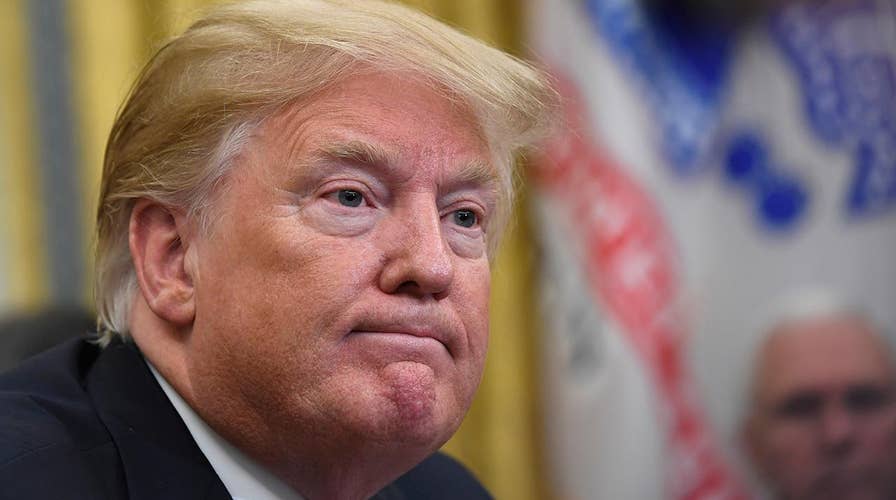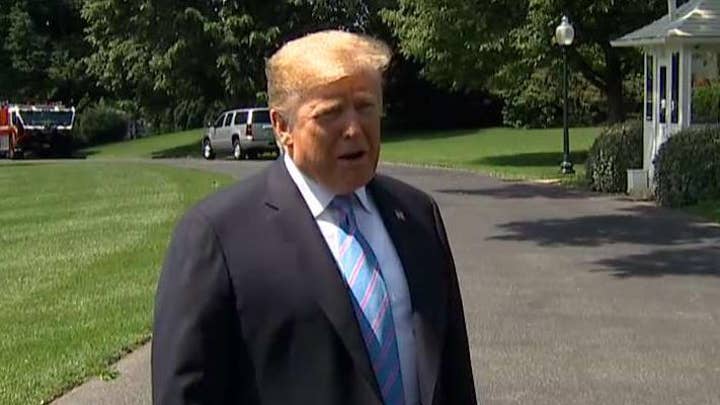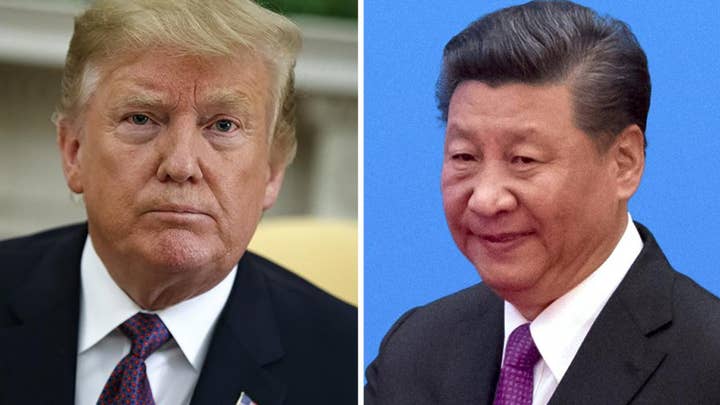Trump argues trade fight with China is worth having to strike 'great deal'
Dow futures rebound after the president says a deal will happen 'much faster than people think'; Kevin Corke reports from the White House.
No, the 1990s didn’t call to say they want their old trade policy back.
When it comes to American trade policy toward China, though, the candidates running for the Democratic presidential nomination are about 20 years behind President Trump.
Liberals have complained bitterly about the president’s aggressive approach to the ongoing trade dispute with China, particularly his use of targeted counter-tariffs to pressure China into stopping its most pernicious trade abuses. Trump’s opponents accuse him of starting a dangerous “trade war” with China, but in reality, China has been waging economic war against the U.S. for decades. President Trump just decided it was time for America to start fighting back.
TO END THE TRADE WAR, AMERICA'S BUSINESS COMMUNITY SHOULD DO THIS
CNBC recently sent out a questionnaire to the top 21 Democrat presidential hopefuls asking how they would handle China as president. The response rate was pathetic. Most candidates couldn’t even muster up an answer – presumably because they didn’t have one they found politically acceptable.
For example, frontrunner Joe Biden failed to respond after laughing off the idea that China even poses a threat to the U.S., an absurd position that he reiterated several days later following criticism for his original comments. Of course, the Obama/Biden administration never could figure out how to deal with China. President Barack Obama even wondered aloud at a campaign event in 2016 what “magic wand” then-candidate Trump would employ to get a better deal with China if he were elected. Given Biden’s comments, I can see why taking a tough stance with targeted tariffs never occurred to them.
The seven Democrats who considered the inquiry worthy of response took laughably naive positions that suggest they’ve been paying little – if any – attention to America’s dealings with its foremost economic rival over the past 20 years decades. But, at least they responded.
These candidates generally acknowledged that the U.S. must confront China on intellectual property theft, forced technology transfers, and other illegal practices but their proposals for doing so have already been tried – and have failed both miserably and repeatedly.
Sen. Bernie Sanders, I-Vt., for instance, asserted that we should “strengthen institutions like the WTO and the U.N. rather than trying to go it alone,” arguing that we should join forces with other countries that share our grievances against China.
Searching for politically acceptable ways to oppose China without supporting the president, the other candidates all echoed Sanders’ support for “multilateral” solutions, particularly the idea that the World Trade Organization (WTO) offers some kind of magic bullet for resolving our complex and long-standing disputes.
Been there, done that. Spoiler alert for Democrat presidential candidates: it was a spectacular failure.
Back in the 1990s, President Bill Clinton paved the way for China to become a full member of the WTO, which became a reality in 2001 with the enthusiastic support of President George W. Bush. The idea was that China being a WTO member would compel it to implement pro-market structural reforms in order to qualify, and that WTO rules would constrain the communist country from cheating thereafter.
As laid out in a detailed report issued last year by the U.S. Trade Representative’s office, we now have nearly two decades of evidence proving just how misguided that theory was.
Despite explicit WTO prohibitions, for instance, China has consistently used “export and import substitution subsidies” to boost domestic industries, established unjustified non-tariff trade barriers to delay imports, and imposed export quotas on raw materials in order to inflate prices for foreign companies.
Of course, the U.S. has challenged such violations, but China has simply defied adverse judgments and continued to brazenly flout WTO rules with anti-competitive practices that create artificial advantages for its own economy.
Rep. Seth Moulton, D-Mass., told CNBC that President Trump “knows nothing about trade,” yet if Moulton and his fellow Democrats truly believe we can just “use the WTO to negotiate trade disputes and establish clear enforcement mechanisms,” then they’re the ones in need of a crash course on trade policy.
Some Democratic candidates actually endorsed the Trumpian approach to trade, seemingly without realizing it. Reps. Eric Swalwell, D-Calif., and Tim Ryan, D-Ohio, (yes, they are both candidates for the Democratic nomination) backed the idea of “targeted tariffs” against China, yet still denounced the Trump administration’s use of that very strategy, inaccurately claiming that Trump’s approach has been “ad hoc” and overly broad.
The overarching takeaway from these responses is that the individuals seeking the Democratic Party’s nomination for president in 2020 are utterly out of their depth when it comes to one of the most critical economic challenges facing our country.
These Democrats want to turn back the clock 20 years and repeat the mistakes that enabled China to become an economic superpower on the back of its rampant trade abuses, gifting China another decade or two of American complacency that Beijing would surely exploit in order to overtake us as the world’s largest economy.
Only if that approach fails, they say, can we consider imposing the targeted counter-tariffs that President Trump has used with such great effect already. Well, that approach has failed and by the time we give it a chance to fail again, it will already be too late.
CLICK HERE TO GET THE FOX NEWS APP
Donald Trump’s understanding of trade policy is so far ahead of his Democratic rivals that it would probably take him longer to explain their folly than to finalize the historic trade agreement with China that has eluded U.S. policymakers for decades.
It’s these Democrats running for president who are calling for America’s 1990’s-style trade solutions. Those policies have failed us for two decades. Fortunately, we have a president who understands what works and what’s politics. He’s going for what works.























